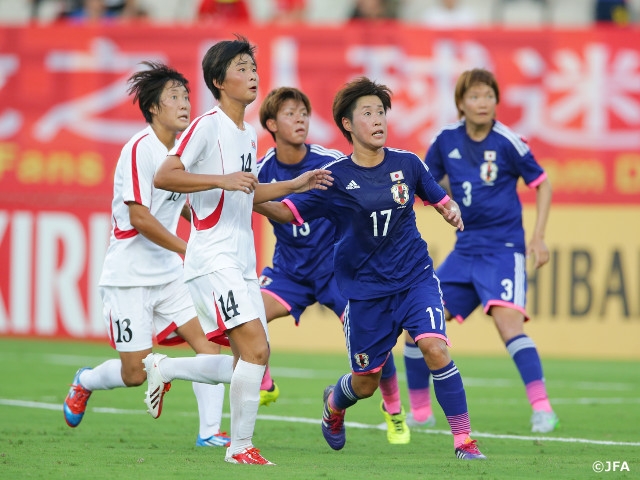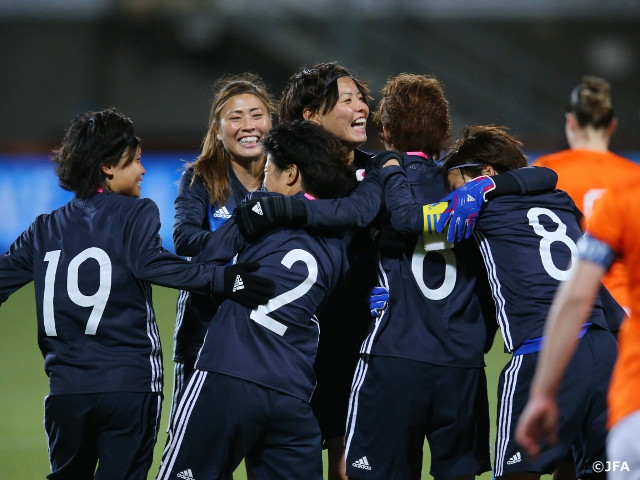NEWS
[ New Year interview with Nadeshiko Japan coach Norio Sasaki ] We’ll prepare for Rio de Janeiro on reflections from Canada
18 January 2016
![[ New Year interview with Nadeshiko Japan coach Norio Sasaki ] We’ll prepare for Rio de Janeiro on reflections from Canada](/img/cache/569c9351-154c-42ff-adc7-773ed3093d95.jpg)
After making it to the final at the FIFA Women’s World Cup Canada 2015 for the second straight time and finishing as the runners-up, Nadeshiko Japan is now set for a new target in 2016, the Rio de Janeiro Olympics. To win one of the two berths given to Asia, the Japanese women’s national team will compete against five of their neighboring powerhouses including Australia and DPR Korea in the upcoming final-round qualifiers from February 29 to March 9 in Osaka. It is expected to be a tough competition for Japan at the start of the new era following the departure of Homare Sawa last year, who had long played for the country as the symbol of Japanese women’s football.
How does coach Sasaki look at the outcomes of the 2015 and what are his thoughts on his side’s new challenges in 2016? The Nadeshiko Japan boss talked at the beginning of the New Year.
Q: In 2015, Nadeshiko Japan finished as the runners-up at the FIFA Women’s World Cup after reaching the final for the second straight time. How do you find the outcomes of your side last year?
The 2015 tournament was much harder than the 2011 one to compete for us. Because of our success at the 2011 tournament, we were in a position to be targeted by the other teams but had a mission to produce the result in the final for the future of Japanese women’s football. I also made attempts to bring in some new players to our World Cup squad to give more depth to our group for our future. But things didn’t work out so well as much as I had hoped, and I had a hard time to decide our squad. On the other hand, the women’s football in the world was making a good progress. United States, for example, had turned to playing more collectively with better quality than before. So, I knew it wouldn’t be so easy at the 2015 tournament.
In fact, we played every game with a one-goal margin. But we were able to produce the results and reached the final thanks to our solid preparations and also our patient game. We ended up with the runners-up position, which brought us something to reflect on, and based on that we’d like to move on to prepare for the Rio de Janeiro Olympics.
Q: With the world women’s football making a development, what do you think the Japanese players have to do to remain competitive internationally?
Since 2011 I have seen that every team is developing their football quality well, and that has made us harder to reach the semifinals at major tournaments. We are going to have a hard time if we don’t make a progress with our younger generations. When I think of the 2019 Women’s World Cup in France and the 2020 Tokyo Olympics, in particular, we should improve the level of our younger generations. We should start that from 2016 and should earn a berth for the Olympics in Rio de Janeiro to help that project. When we can do that, then we can take advantage of three to four years to bring up the younger generations and form a team for future. That is important.
Q: You gave some younger players opportunities to play at the EAFF Women’s East Asian Cup last summer. What is your assessment on their performance so far? What do you expect them to develop their game?
There are some gaps between our domestic league and the international football with regard to, say, a reach distance, power, and playing tempo and so on. The Europe-based players and the experienced players are no problem with adjusting to those differences when needed, but the younger players need more time to adjust themselves into those differences. I encourage them to get the feelings of those points in training sessions with men’s players and having some training matches with them.
If you don’t really understand the significance of those gaps and become adjustable to them, you tend to neglect your play when you get tired. That can only let your opponents to create decisive moments in a game. Therefore I want them to work much harder, say with a stronger concentration for 90 minutes so that they can be outstood among the others in their training sessions.

Q: It seems that Nadeshiko Japan is facing a turnabout after Homare Sawa retired from the game at the end of last year, right?
I think the players are missing her pretty much, but we Nadeshiko Japan cannot stop here. We had a similar situation when we didn’t have her in some of the tournaments. From those experiences I think the players like [Aya] Miyama and [Yuki] Ogimi learned something, and they, together with the core players of the squad, can take a leadership to guide the team to go further. The players should continue to make efforts to improve their game in order to pay back their senior players’ contributions of paving the way to the higher stages.
Q: In 2016, we have the Rio de Janeiro Olympics in summer and the final-round qualifiers for the Olympics from the end of February. What is your prospect on the qualifiers?
Women’s world football is changing and Asia is changing as well. Australia is gaining in strength. As they keep the same players around 12 to 13 of them to form their team, they are improving their unity and have experienced in beating a strong side like Brazil. China is getting better and Korea Republic is also building around more or less the same players. DPR Korea reshuffled their team with younger players a few years ago and is establishing their style with them. They now have added experience and stability in play. Vietnam had a Japanese coach, who led them create good atmosphere and good style. So you can see it’ll be a tough competition to win a berth against them.
Q: We can play the final-round qualifiers on our home soil in Osaka, right?
I think we can have extra pressures in many areas but I am hoping that we can handle them and turn them into our power to play the tournament. It will be a good opportunity for us to play before our home fans, and we’d like to play games that can deliver dreams to girls and our people.
When Nadeshiko Japan played the qualifiers for the 2004 Athens Olympics at home, they won the qualification. For the Rio 2016, we are getting qualification news from women’s basketball, rugby sevens and some other sports these days, and their good flow has spurred me and our players. Our determination for the Olympic qualifiers is pretty strong.
Q: What would you like to work on during your preparation camps for the qualifiers?
At our first camp in January, we’d like to focus on what we should do as a team and make sure that all our players get the idea of that. Then, we can do what we have to do when our Europe-based players join us again shortly before the competition. We will do our second camp in February only with our Japan-based players, and it will be a competition for them to win a position on the team. They should show me their understanding on what they have to do. I will then cut down the number of players to name the 20 members for the final-round qualifiers. I’d like to form a team with those who can play hard to get through the qualifiers.
Q: What is your objective in Rio de Janeiro then?
Winning a medal is something you can achieve only when you aim at. I would like to go there with a strong belief of winning the gold medal. To do so, we have to start with the qualifiers first. As a national team coach, I always take a tournament as a compilation of my coaching work and will keep that attitude to go to Rio as well.

Related Information
Latest News
-
National Teams
2025/06/28
【Match Report】Nadeshiko Japan Fall 1–3 to Spain

-
National Teams
2025/06/24
U-16 Japan National Team squad & schedule - China PR Tour: CFA PEACE CUP (7/1-9@Shenyang, China PR)

-
National Teams
2025/06/19
U-17 Japan Women's National Team squad & schedule - USA Tour (6/21-7/3@Kansas City, USA)

-
National Teams
2025/06/17
Nadeshiko Japan (Japan Women's National Team) squad & schedule - EAFF E-1 Football Championship 2025 Final Korea Republic (7/6-17@Korea Republic)

-
National Teams
2025/06/17
Nadeshiko Japan (Japan Women's National Team) squad & schedule - International Friendly Match vs Spain Women's National Team (6/27@Madrid, Spain)



